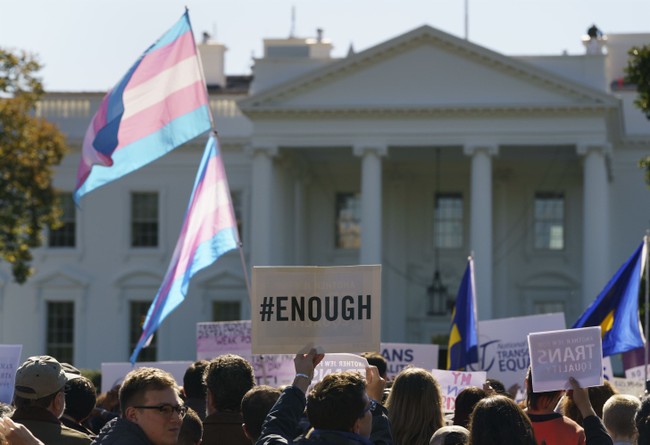
Living between France and Britain, I am struck both by how different and how similar they are, the differences obvious and the similarities underlying. Chief among the underlying similarities is the imperative need for, and the simultaneous complete impossibility of, reform. The need is economic, and the impossibility is political: For a large enough constituency […]



U.S. — With rapid advancements in technology and government intrusion into the lives of citizens, scientists sounded the alarm to warn that they were running out of dystopian sci-fi movies to make into reality.
The separation of church and state is a principle established back in the Enlightenment era, one recognised in the US Bill of Rights. Establishing "a wall of separation between Church and State," Thomas Jefferson explained the principle in a famous letter to the Danbury Baptist Association:
Believing with you that religion is a matter which lies solely between Man & his God, that he owes account to none other for his faith or his worship, that the legitimate powers of government reach actions only, & not opinions, I contemplate with sovereign reverence that act of the whole American people which declared that their legislature should 'make no law respecting an establishment of religion, or prohibiting the free exercise thereof,' thus building a wall of separation between Church and State.
The principle rests on this compelling point: "that the legitimate powers of government reach actions only, & not opinions," so that neither the Danbury Baptist Association nor any other religious-based group need fear government interference in their right to expressions of religious conscience.
This was a historic change from centuries of religious persecution. This is a point now unfortunately lost on New Zealand's legislators, who for decades have routinely inserted into law concepts emanating from Māori spirituality, customs, and worldviews, i.e., Māori religion.
Law, we should be reminded, is a description of the way in which a government proposes to exercise its monopoly on force. As such, we should demand precision, objectivity, and concepts based on protecting individual rights. Instead, as a result of this departure from proper principle we have been delivered law that is imprecise, and riddled with bogus concepts based on a particular religious worldview.
Author and researcher John Robinson lists 35 New Zealand laws that officially reference Māori spirituality, customs, and worldviews — using terms like tikanga, mana whenua, mauri, wairua, and more. Among them are many that might surprise you:
Resource Management Act 1991 (RMA)
Terms: Te Mana o te Wai, kaitiakitanga, mauri, wairua, tikanga Māori, mana whenua
Context: Gives legal status to Māori spiritual values when assessing environmental impacts and resource consent.
Water Services Act 2021
Terms: Te Mana o te Wai, kaitiakitanga
Context: Water regulation must consider Māori spiritual views on water’s life force and guardianship.
Local Government Act 2002
Terms: tikanga Māori, mana whenua
Context: Requires councils to involve Māori in decision-making and give weight to their cultural practices.
Conservation Act 1987
Terms: kaitiakitanga, tikanga Māori, mana whenua
Context: Māori beliefs must be considered in conservation efforts and land access.Waitangi Tribunal Act 1975
Terms: tikanga Māori, Treaty principles
Context: Empowers Māori customs and grievances to be judged by Māori cultural norms.Environment Canterbury Act 2016
Terms: mana whenua representation
Context: Mandates tribal representation in regional governance based on ancestral authority.Oranga Tamariki Act 1989
Terms: whakapapa, mana tamaiti, tikanga Māori
Context: Māori child welfare decisions must respect spiritual ancestry and cultural norms.Education and Training Act 2020
Terms: tikanga Māori, Treaty principles, mana whenua
Context: Embeds Māori values and customs into the public education system.Climate Change Response Act 2002
Terms: tikanga Māori, kaitiakitanga, Te Tiriti o Waitangi
Context: Climate planning must consider Māori spiritual guardianship of nature.Crown Minerals Act 1991
Terms: tikanga Māori, mana whenua, Treaty principles
Context: Requires consultation with Māori based on cultural and spiritual claims to land and minerals.Biosecurity Act 1993
Terms: tikanga Māori, mana whenua, Treaty of Waitangi
Context: Disease and pest control policy must consider Māori views on spiritual and land connections.Public Health and Disability Act 2000
Terms: tikanga Māori, mana motuhake, Treaty of Waitangi
Context: Health services are required to reflect Māori beliefs and autonomy.Wildlife Act 1953
Terms: customary rights, tikanga Māori, mana whenua
Context: Spiritual and cultural practices are recognized in hunting and wildlife protections.Forests Act 1949
Terms: tikanga Māori, Treaty of Waitangi
Context: Forest use and protection must consider Māori customs and Treaty rights.Heritage New Zealand Pouhere Taonga Act 2014
Terms: wāhi tapu, wāhi tūpuna, tikanga Māori, mana whenua
Context: Sacred and ancestral Māori sites are protected by law.Pae Ora (Healthy Futures) Act 2022
Terms: tikanga Māori, Māori Health Authority, Treaty of Waitangi
Context: Establishes a parallel Māori health system based on cultural values.Kainga Ora–Homes and Communities Act 2019
Terms: tikanga Māori, mana whenua, Treaty obligations
Context: Housing projects must align with Māori cultural values and Treaty-based consultation.Land Transport Management Act 2003
Terms: mana whenua, Treaty principles
Context: Māori cultural considerations must be included in transport planning.Hauraki Gulf Marine Park Act 2000
Terms: kaitiakitanga, tikanga Māori, mana whenua
Context: Spiritual guardianship and cultural relationships must be respected in marine planning.Walking Access Act 2008
Terms: tikanga Māori, mana whenua
Context: Access to land and tracks must consider Māori spiritual and cultural significance.EEZ and Continental Shelf (Environmental Effects) Act 2012
Terms: tikanga Māori, Treaty principles, mana whenua
Context: Deep-sea resource use must consult Māori cultural and spiritual perspectives.National Parks Act 1980
Terms: kaitiakitanga, wāhi tapu, tikanga Māori
Context: Māori spiritual values influence park management and access.Marine Reserves Act 1971
Terms: kaitiakitanga, tikanga Māori
Context: Customary guardianship and Māori beliefs influence reserve designation and rules.Antarctica (Environmental Protection) Act 1994
Terms: tikanga Māori
Context: Even activities in Antarctica must respect Māori spiritual customs.Building Act 2004
Terms: tikanga Māori, mana whenua
Context: Local iwi spiritual and cultural views must be considered in development approvals.Te Urewera Act 2014
Terms: legal personhood, tikanga Māori, mana whenua
Context: Grants a forest legal status as a living ancestor with spiritual significance under Māori belief.Whanganui River Settlement Act 2017 (Te Awa Tupua)
Terms: legal personhood, tikanga Māori, mana whenua
Context: Declares the river a living entity with rights, based on Māori cosmology.Taranaki Maunga Settlement Act 2023
Terms: legal personhood, tikanga Māori, mana whenua
Context: Gives Mount Taranaki the same spiritual and legal status as a living being.Criminal Cases Review Commission Act 2019
Terms: te ao Māori, tikanga Māori
Context: Māori spiritual and cultural views may influence justice processes and reviews.Trade Marks Act 2002
Terms: mātauranga Māori, tikanga Māori
Context: Māori traditional knowledge and customs can affect trademark approvals.Patents Act 2013
Terms: mātauranga Māori, tikanga Māori
Context: Patents can be denied or restricted based on spiritual and cultural beliefs.
Each of these inclusions undermines law, makes its exercise illegitimate and imprecise, and requires by law that all New Zealanders bow to a religion — one based on race — that is not necessarily their own.
As a commenter observes,
There are also numerous reports/frameworks affirming the Te Ao Maori vision- a powerful and authoritative reference to guide action and establish norms, e.g. Te Rautaki Ao Maori—guidelines for NZ parliamentary process, Matauranga Maori in the Media, and many more.
NZers are now enmeshed in a web of embedded "cultural references" which decree how to live their lives.
There is neither a moral nor a legitimate legal case for that.
Next Page of Stories


